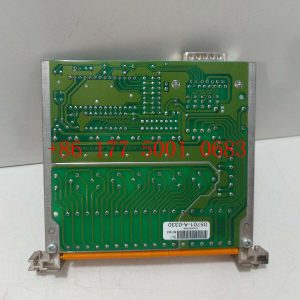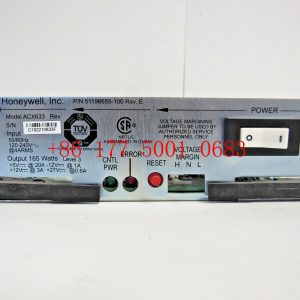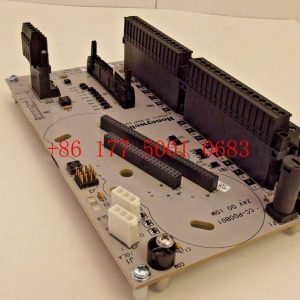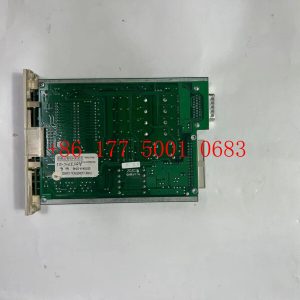Description
hardware flow control. It is an ideal choice in the field of industrial automation.
Why is the industrial Internet inseparable from industrial control?
ABB Global CEO Ulrich Spiesshofer recently accepted an exclusive interview with a reporter from Caijing in New York. He believes that the global manufacturing industry is
undergoing drastic changes. The era of labor arbitrage is over. Labor costs are no longer the focus of competition. The future of manufacturing lies in In factories that are smaller,
closer to consumers, and more agile. Artificial intelligence ( AI ) is the most important technology shaping the future of manufacturing. Currently, AI technology is mainly used in the
consumer field, but its large-scale application in the industrial field and among enterprises is more critical.
Digital transformation has been a keyword for global manufacturing giants in the past two years, and the industrial Internet is the implementation form of digital transformation.
General Electric (GE), Siemens and ABB are all leaders in this regard . Spiesshofer believes that GE”s industrial Internet only collects data and analyzes but cannot control it.
As the world”s two largest industrial automation suppliers, ABB and Siemens have the ability to control equipment, which is a significant difference from GE.
ABB is headquartered in Zurich, Switzerland. Its history can be traced back to the 1880s. It started from the original electrical manufacturing business and has developed into an international manufacturing
giant including electrical products, robotics and motion control, industrial automation and power grid. In 2017, ABB”s revenue was US$34.3 billion, ranking 341st among the
Fortune 500 companies. Spiesshofer has served as CEO for nearly five years since taking office in September 2013.
Below are the details of the interview.
The era of labor arbitrage is over
Caijing: Is 2018 a good year for the manufacturing industry?
Spiesshofer: From a global perspective, GDP is growing and consumption is also growing. Overall positive.
Caijing: What crucial changes are taking place in the manufacturing industry?
Spiesshofer: The jobs of the future will be different from the jobs of the past. In the Middle Ages, craftsmen moved between villages, taking their tools with them to work where
there was demand; later we invented factories, integrated supply and demand, and invented logistics; later people realized that there was labor arbitrage (Labor Arbitrage, Refers to
the existence of moving industries that have lost technological advantages and technical barriers to areas with low labor prices to increase profits by reducing labor costs), so we place
factories in emerging countries to benefit from labor arbitrage.
Now, with the development of modern automation and robotics, we can break this picture and bring value addition closer to demand. I think the future of manufacturing is
in factories that are smaller, closer to consumers, and more agile. I believe that the global logistics chain will also be reduced in the future because we will produce products closer to consumers.
The era of labor arbitrage shaping the global manufacturing landscape will be over because we can offset this arbitrage.
Recently we opened a new factory in Germany. Due to the adoption of intelligent automation technology, its unit cost is exactly the same as that of the best factories in
China. So I think the local market will be repositioned in the future, and the positioning of competitiveness will also change from just considering costs to focusing more on technology and value.
Caijing: Many people are complaining that automation has caused people to lose their jobs, and artificial intelligence technology has made the complaints louder
. But these new technologies are also creating new jobs. How do you see the relationship between the two?
Spiesshofer: In 1990, one-third of the world”s population lived below the extreme poverty line. Today, only 8% rely on technology. In fact, countries with the
highest robot densities, such as Germany, South Korea, Singapore, and Japan, also have the lowest unemployment rates. Robots combined with educated people can create prosperity, produce more
affordable goods, and lead to economic growth. Government, education and business need to work together to keep up with the changing world.
Clearly, millions of jobs are disappearing, but millions of new ones are being created. Taking our own business as an example, we used to have many
employees doing metal casting and forging work, but now these tasks are automated. But now we have more employees working in the service industry, developing apps, and working with customers.
So I think we should not be afraid of change, but should lead our employees to manage change and promote change. If we succeed, global employment will eventually grow.
ED1822A HEDT300867R1 ABB Power drive board
DSXS001 57170001-A ABB DSXS 001 DCS communication module
DSTD W113 57160001-ZL ABB DSTDW113 Connection Unit
DSTD150A 57160001-UH ABB Connection Unit for Digital
DSTD108 57160001-ABD ABB Connection unit
DSTC190 57520001-ER ABB Connection Unit
DSSR122 48990001-NK ABB Dc input power unit
DSDI 110AV1 3BSE018295R1 ABB DSDI110AV1 Digital input pad
DSDI110A 57160001-AAA ABB Digital input pad
DSCS140 57520001-EV ABB Analog output module
DSCL110A 57310001-KY ABB Terminal unit
0090-00224 APPLIED MATERIALS PCB I/O EXPANSION
LT371B GJR2336800R1 ABB Brown Boveri (BBC)
GJR5252100R3261 07KT94 ABB relay
GJR5145600R0001 35AB95 ABB Brown Boveri (BBC)
GJR5145000R0301 35ZE93B ABB Brown Boveri (BBC)
GJR5143600R0001 35TP90 ABB Brown Boveri (BBC)
GJR5137200R0005 35AE92F-E ABB Controller module
GJR5132200R0001 35AB90 ABB Electronic component
GJR2390200R1010 83SR04D-E ABB Control Board
GJR2368900R2340 87TS01I-E ABB Printing plate module
89NU01D-E GJR2329100R0100 ABB Driver module
88VP02B-E GJR2371100R1040 ABB Electronic control module
88UB01 GJR2322600R1 ABB Coupled module
88TK02C-E GJR2370400R1040 ABB Analog Input Module
87TS01I-E ABB Coupled module
81EA11D-E GJR2374800R0210 ABB Analog Input Module
07ZE40 gjr2268800r22 ABB Analog input module
HESG447419R0001 70EA05A-E ABB Pcb board module
70EA01b-E HESG447038R1 ABB Analog input module
ACS100-PAN 61341722 Control Panel New original
BCU-02 3AUA0000110429L Control Unit Suite New original
1TGE120026R0103 Operation panel New original
Bra-669c 6438177017035 Brake Chopper New original
ICSI16E1 FPR3316101R0034 Binary input unit New original
5SDD1060F0001 Soft startup ABB tablet thyristor New original
KVC758A124 3BHE021951R1024 Control board module New original
BINT-12C interface board New original
UNITROL 1005 Indirect excitation system UNITROL1005 New original
IT8000E-AC weighing terminal New original
TTH300-E1-H temperature transmitter New original
FAU810 flame analysis unit New original
UFC719AE01 3BHB000272R0001 Drive Controller New original
AGPS-11C 3AFE64692585 anti-mis-start circuit board New original
UDD406A 3BHE041464R0101 Digital input module New original
DP820 3BSE013228R1 dual channel pulse counting module New original
UAC389AE02 HIEE300888R0002 Control board module In stock
FI840F Fieldbus module New original
DSAB-01C evaluation board In stock
XUD194 3BHE018137R0001 Optical Fiber Repeater New original
5SHY4045L0004 Thyristor In stock
PPD103-B03-10-150000 Central processing unit New original
07AC91F GJR5252300R0101 Analog input/output module In stock
SPBRC410 Controller with Modbus TCP interface New original









Reviews
There are no reviews yet.